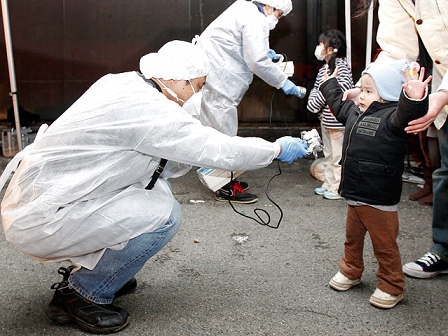Erstellt am: 15. 3. 2011 - 10:29 Uhr
Was sind die nächsten notwendigen Schritte?
- Neuigkeiten auf news.ORF.at
- Aktuelle Kurzmeldungen
- ORF Sondersendungen zum Beben: Die Nachrichtensendungen gibt es auch in der ORF TVthek
- Vorher/Nachher-Fotostrecke auf abc.net.au
- Auf TW1 und in der TVthek zeigt der ORF Berichterstattung des japanischen Senders NHK
- Alle FM4 Artikel auf einen Blick: fm4.orf.at/japanbeben
Eine Übersicht über verschiedene Spendenmöglichkeiten:
Spenden für Japan
Montag Nacht hat sich im Atomkraftwerk Fukushima I wieder eine Explosion ereignet. Tags darauf spricht selbst die japanische Regierung von austretender, gesundheitsgefährdender Strahlung. Auch im Großraum Tokio, in dem 40 Millionen Menschen leben, wurden bereits erhöhte Werte gemessen. Neben der wachsenden atomaren Katastrophe müssen trotzdem Rettungen, Evakuierungen und Aufräumarbeiten wegen des Erdbebens und des Tsunamis vonstatten gehen.
Today in Reality Check
The fears of dangerous radiation contamination in Japan are increasing. Radiation levels around the Fukushima plant rose starkly overnight following another explosion and a fire. Residents who remain within a 20 kilometer ring of the plant have been ordered to leave and those between 20 and 30 kilometers have been told to stay inside with their air-conditioning turned off. Beyond that, although elevated readings have been recorded, authorities insist that they are well below levels that could impact human health
Yet for the workers at Fukushima, the situation is very concerning. The plant’s operator admitted that at one point in the immediate vicinity of the reactors the levels of one hour's exposure rose to eight times the legal limit for exposure in one year.
What is the human of that sort of radiation exposure. Chris Cummins asked Andy Coughlin of New Scientist:
Dieses Element ist nicht mehr verfügbar
As the exclusion zone around the stricken Fukushima nuclear power plant is enlarged, nuclear energy expert John Large explains the radiation threat posed by the crisis, and Andy Coghlan of New Scientist explains the health implications for residents of the area.
Dieses Element ist nicht mehr verfügbar
Greenpeace's nuclear experts in Japan give their analysis of the situation at Fukushima, saying the situation is worse than the power company or the government are admitting.
Dieses Element ist nicht mehr verfügbar
Economic fallout: Japan is one of the world's largest economies, and in the aftermath of the earthquake and tsunami, it is virtually at a standstill. What impact will this have in the months and years to come?
Dieses Element ist nicht mehr verfügbar
- Germany's nuclear policy reversed
Germany does a complete U-turn on its policy to extend the lifetime of its nuclear power plants. Our Berlin correspondent, Kyle James, considers whether this is internal politics or a response to events in Japan.
Gäste in FM4 Connected
Wie können die Menschen in den betroffenen Gebieten und die Einsatzkräfte dieses dreifache Desaster bewältigen? Was sind die nächsten notwendigen Schritte? Welche Entwicklung ist im Atomkraftwerk Fukushima in den nächsten Tagen zu erwarten? Diese und weiter Fragen versuchen heute zwei Experten im Connected Studio zu beantworten:
Emmerich Seidelberger ist Experte für Atomkraft und Risikoforschung an der BOKU Wien. Er hat auch als Experte für Notkühlsysteme in Atomkraftwerken gearbeitet.
Max Santner leitet die internationale Hilfe beim Österreichischen Roten Kreuz. Er war nach dem verheerenden Tsunami 2004 für zwei Jahre in Sri Lanka.

Reuters/Kim Kyung-Hoon
Die Studiodiskussion vom 15. März 2011:
Dieses Element ist nicht mehr verfügbar
Die aktuellsten Neuigkeiten gibt es laufend auch auf news.ORF.at. FM4 sendet zusätzliche deutschsprachige Nachrichten um 10.30 und 11.30, sowie ab 14.30 durchgehend bis 18.30.
Am Mittwoch in FM4 Connected
Wir telefonieren mit unserem Japan-Korrespondenten Martin Fritz, der Tokio inzwischen verlassen hat und sich aus Osaka meldet. Und: Die Universität Wien hat zu einer Informationsveranstaltung geladen. Seismologe Prof. Götz Bokelmann und Risikoforscher Prof. Wolfgang Kromp erklärten die aktuelle Situation und beantworteten die Fragen der BesucherInnen. Barbara Köppel war für uns vor Ort.

